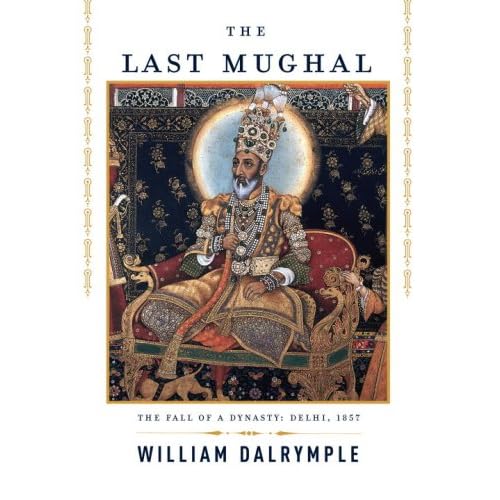The Last Moghul by William Dalrymple
In an interview Dalrymple says this: The narrative revolves particularly around the last Moghul emperor Bahadur Shah Zafar who creates this wonderful renaissance at the very end of Moghul rule, and who lived to his old age to see that destroyed when the Indians rose up in mutiny against the British and were crushed horribly, in what remains one of the great unwritten genocides of the British Empire. People are aware now of the destruction of the Aborigine peoples of Australia and Tasmania, the Irish potato famine is well documented; this is an imperial horror story of a similar scale, when the British surround and destroy Delhi. It’s never been written up completely for example how the British track down, hunt and kill every last Moghul prince they can find.
Dalrymple's research for this book was as thorough and meticulous as we would expect of him. What was amazing was to learn that he and his colleagues found the Persian and Urdu documents relating to Delhi in 1857, known as The Mutiny Papers and housed in the National Archive of India in New Delhi, virtually unused. He describes his discovery of this treasure as one of the highlights of the whole project. What he describs as 'the street-level' nature of some of the material enables him to layer his narrative, giving it a totally convincing graphic quality that conventional histories miss. We get 'the larger picture', the political, religious and military forces at work, as well as detailed accounts of the way in which these were experienced by innumerable individuals, members of Zafar's family and court as well as the commmon citizens of Delhi.
Irfan Husain, a Pakistani commentator, in an article in Khaleej Times Online says:
As so brilliantly chronicled by William Dalrymple in ‘The Last Moghul’, the British exiled the King and killed his heirs, thus ending the dynasty started by Babur over three centuries ago. To be accurate, the line had been in a state of decline for years, and the Uprising was the last nail in its coffin.
Husain goes on to explain that it was Dalrymples' book which encouraged him to search Karachi's Sindh archives and find there yet more records of the fall-out from the Mutiny - that, for example, some of the exiled prisoners from Delhi were transported from Karachi to the Andaman Islands. The whole article is here: http://www.khaleejtimes.com/ColumnistHomeNew.asp?xfile=data/irfanhusain/2007/January/columnistirfanhusain_January1.xml§ion=irfanhusain&col=yes
Dalrymple ends the book by tracing the 'fall-out' from the destruction of the Mughals' 'peaceful and tolerant attitude to life', regretting what he sees as 'the bleak dualism' of today's confrontations beween nations, ideologies and religions. There is, he says, '..much to regret in the way that the British swept away and rooted out the late Mughals' pluralistic and philosophically composite civilisation.'
Dalrymple's research for this book was as thorough and meticulous as we would expect of him. What was amazing was to learn that he and his colleagues found the Persian and Urdu documents relating to Delhi in 1857, known as The Mutiny Papers and housed in the National Archive of India in New Delhi, virtually unused. He describes his discovery of this treasure as one of the highlights of the whole project. What he describs as 'the street-level' nature of some of the material enables him to layer his narrative, giving it a totally convincing graphic quality that conventional histories miss. We get 'the larger picture', the political, religious and military forces at work, as well as detailed accounts of the way in which these were experienced by innumerable individuals, members of Zafar's family and court as well as the commmon citizens of Delhi.
Irfan Husain, a Pakistani commentator, in an article in Khaleej Times Online says:
As so brilliantly chronicled by William Dalrymple in ‘The Last Moghul’, the British exiled the King and killed his heirs, thus ending the dynasty started by Babur over three centuries ago. To be accurate, the line had been in a state of decline for years, and the Uprising was the last nail in its coffin.
Husain goes on to explain that it was Dalrymples' book which encouraged him to search Karachi's Sindh archives and find there yet more records of the fall-out from the Mutiny - that, for example, some of the exiled prisoners from Delhi were transported from Karachi to the Andaman Islands. The whole article is here: http://www.khaleejtimes.com/ColumnistHomeNew.asp?xfile=data/irfanhusain/2007/January/columnistirfanhusain_January1.xml§ion=irfanhusain&col=yes
Dalrymple ends the book by tracing the 'fall-out' from the destruction of the Mughals' 'peaceful and tolerant attitude to life', regretting what he sees as 'the bleak dualism' of today's confrontations beween nations, ideologies and religions. There is, he says, '..much to regret in the way that the British swept away and rooted out the late Mughals' pluralistic and philosophically composite civilisation.'


2 comments:
"Genocides"? Are you sure?
I'll try and post one of Zafar's poems-it was my grandfather's favourite.
Can't read the Last Mughal now..just got 'The First Man' in the post. But no, please carry on with blogs about the sins of the English..,(I exclude my soul-borthers, the Welsh, from this story!).
By the way C, you may be interested in Mike Davis' 'Late Victorian Holocausts'.
'Genocides' is Dalrymple's word - maybe one must read his account to form an opinion on that. Whatever, the reprisals were savage and sweeping in the extreme.
Yes, please, I would love to read some of Zafar;s poems. How much is in orint, in translation?Dalrymple emphasises the high cultural one and achievements of Zafar, his court and,indeed, Delhi as a city.He describes Zafar in his youth as 'a good example of the sort of rounded Renaissance Man that a serious Mughal education sought to produce....'
Unfortunately,very litle of Zafar's poetry is quoted, except in one instance (see below) to illustrate his sense of imprisonment under British rule before 1857, when his powers had been stripped from him and he was living within the Red Fort 'as if he were an Indian pope within his own Vatican City'.
I want to shatter the bars of my cage
With the flutterings of my wings
But like a caged bird in a painting
There is no possibility of being free.
Morning breeze, tell the garden
That Spring and Autumn for me are alike.
How should I know,
When one comes and the other goes?
Post a Comment